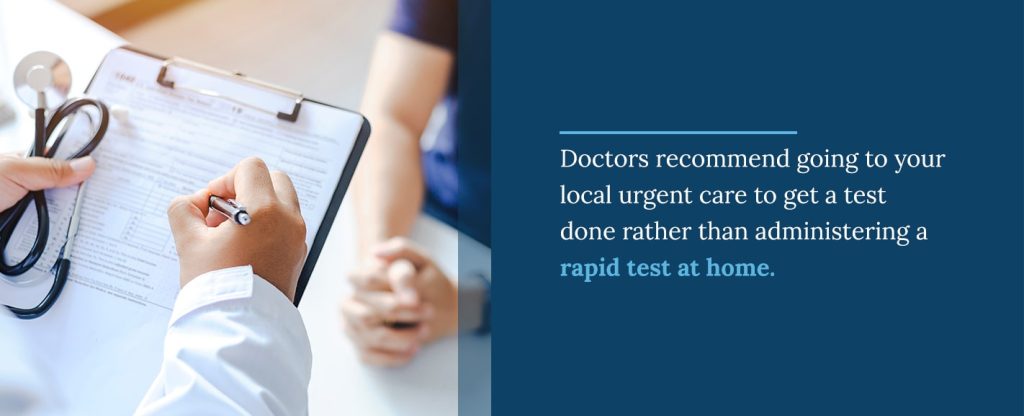You wake up to your alarm and the surprise of a scratchy, irritated throat. Could your sore throat be just that — from a cold or using your voice too much — or is it the first sign of strep throat?
Since a sore throat is a common strep throat symptom, many people confuse them and are unsure what care they need. Keep reading to learn about the differences between strep vs. a viral infection.
Sore Throat Symptoms
A sore throat — medically known as pharyngitis — can be caused by several factors, including bacterial infections and allergies to pollen, dust and food. It can also come from overusing your voice, having a dry mouth, sleeping with your mouth open or a burn from swallowing hot food. However, colds and the flu are the most common causes.
Some common symptoms include:
- Pain when swallowing or talking
- Scratchy and swollen throat
- Moderate fever
- Hoarseness in voice
- Swollen glands that cause a lump on the neck
- Runny nose and congestion
- Mild cough
Sore throats are usually treatable at home and heal on their own.
Strep Throat Symptoms
Streptococcal bacteria cause strep throat. This bacteria is highly contagious, so developing strep throat means you likely got it from someone else. The bacteria can spread if someone with the infection sneezes, coughs or shares food or a drink with someone else. You can also pick it up by touching an area where the infection resides — like a doorknob or car steering wheel — and immediately touching your nose, eyes or mouth without washing your hands.
Strep throat is most common in children during the winter and spring. Close contact during these months is an agonist for the infection’s spread.
The symptoms of strep throat are similar to a sore throat but on an elevated scale. Contact your doctor if you or your child experiences any of the following symptoms for more than two days:
- White spots on the tonsils or back of the throat
- A sore throat without coughing or congestion
- High fever of 101 degrees Fahrenheit or above
- Nausea or vomiting
- Red rash starting on the face or neck (known as scarlet fever)
Will Strep Go Away on Its Own?
As a bacterial infection, strep does not go away on its own. Fortunately, treatment is straightforward when you see a medical professional for antibiotics.
What to Do If You Think You or Your Child Has Strep Throat
While getting medical care is necessary for strep, there’s no need to rush to the emergency room unless you suspect another, more severe issue. If you or your child have common strep symptoms, your local urgent care, health center or general practitioner will have the resources to test for strep.
Get Tested for Strep
Doctors recommend going to your local urgent care to get a test done rather than administering a rapid test at home. A provider’s kits are more reliable when testing for antigens belonging to the streptococcus bacterial strain.
Even if you receive a negative result, doctors may perform a throat culture to ensure you do not have strep. Results for these tests are not as quick and may take one to two days to return. In the meantime, try some home remedies listed below to relieve the pain.
If your test is positive, the next step is to pick up the antibiotics your physician prescribes and be sure to take all of them, even if your symptoms fade. Not finishing the prescription may leave some leftover bacteria to flare up, creating another round of strep.
Soothe the Pain
Whether you’re waiting for your test results or beginning antibiotics, you can try a few options to reduce the pain:
- Drink warm liquids: Hot tea with honey and lemon or soup broth are great options to settle the pain in your throat. As a bonus, these comforting drinks are excellent additions to a cozy environment.
- Swish with warm salt water: Stir half a teaspoon of salt in a cup of warm water. Sip it and tip your head back to gargle the salt water. Spit the water out into the sink after about 30 seconds.
- Eat ice cream: Is there anything a scoop of ice cream can’t cure? The cold can help relieve sore throat swelling, like icing a minor sports injury. Sucking on ice chips could also work if ice cream isn’t an option.
- Use over-the-counter (OTC) options: Remedies such as throat lozenges, throat sprays and ibuprofen can temporarily reduce soreness and inflammation. Acetaminophen and ibuprofen can also help you feel better.
- Take it easy: One of the most important tips for a steady recovery is to get lots of rest. Your body will be working overtime to cure the pain, so allow it to rejuvenate by sleeping, reading a book or enjoying another low-energy activity. Be sure to rest your vocal cords since talking or singing can irritate your throat.
How to Prevent Strep Throat in the First Place
Strep throat can be a very uncomfortable experience, even if one of the home remedies is to watch a movie with a bowl of ice cream, which would be an example of strep throat self-care. You can follow some of our top tips to prevent strep if it’s floating around your home or workplace. We recommend washing your hands frequently, using hand sanitizer and avoiding using someone else’s items.
Seek Treatment at Hamilton Health Center
The professionals at Hamilton Health Center are passionate about providing treatment to anyone regardless of economic, health or insurance status. To get tested for strep or schedule an appointment, contact our team.



